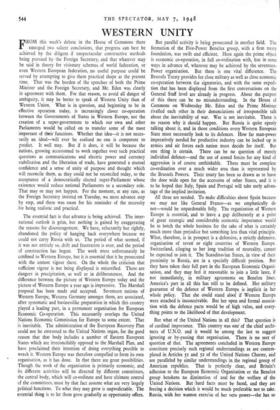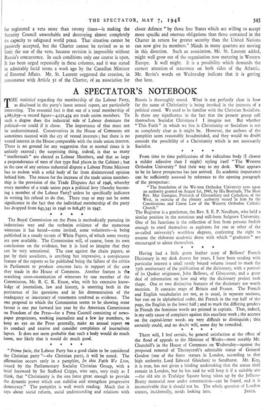WESTERN UNITY
FROM this week's debate in the House of Commons there emerged two salient conclusions, that progress can best be achieved by the diligent if unspectacular constructive methods being pursued by the Foreign Secretary, and that whatever may be said in theory for visionary schemes of world federation, or even Western European federation, no useful purpose could be served by attempting to give them practical shape at the present time. That was the burden of the speeches of both the Prime Minister and the Foreign Secretary, and Mr. Eden was clearly in agreement with them. For that reason, to avoid all danger of ambiguity, it may be better to speak of Western Unity than of Western Union. What is in question, and beginning to be in effective operation today, is increasingly closer co-operation between the Governments of States in Western Europe, not the creation of a super-government to which our own and other Parliaments would be called on to transfer some of the most important of their functions. Whether that idea—it is not neces- sarily an ideal—will ever be realised no one is competent to predict. It well may. But if it does, it will be because the nations, growing accustomed to work together over such practical questions as communications and electric power and currency stabilisation and the liberation of trade, have generated a mutual confidence and a sense of unity of purpose and thought which will reconcile them, as they could not be reconciled today, to the acceptance of a democratically elected super-Parliament whose existence would reduce national Parliaments to a secondary role. That may or may not happen. For the moment, at any rate, as the Foreign Secretary insisted on Tuesday, we must advance step by step, and there was room for his reminder of the necessity ,for being realistic and practical.
The essential fact is that advance is being achieved. The inter- national outlook is grim, but nothing is gained by exaggerating the reasons for discouragement. We have, reluctantly but rightly, abandoned the policy of hanging back everywhere because we could not carry Russia with us. The period of what seemed, if it was not entirely so, drift and frustration is over, and the period of construction has begun. The work must unfortunately be confined to Western Europe, but it is essential that it be prosecuted with the utmost vigour there. On the whole the criticism that sufficient vigour is not being displayed is unjustified. There are dangers in precipitation, as well as in deliberateness. And the difference between the picture of Western Europe today and the picture of Western Europe a year ago is impressive. The Marshall proposal has been made and accepted. Seventeen nations of Western Europe, Western Germany amongst them, are associated, after systematic and businesslike preparation in which this country played a leading part, in a permanent organisation for European Economic Co-operation. This necessarily overlaps the United Nations Economic Commission for Europe to some extent. That is inevitable. The administration of the European Recovery Plan could not be entrusted to the United Nations organ, for the good reason that that body includes a number of Eastern European States which are irreconcilably opposed to the Marshall Plan, and have proclaimed their intention of doing everything possible to wreck it. Western Europe was therefore compelled to form its own organisation, as it has done. In that there are great possibilities. Though the work of the organisation is primarily economic, and its different activities will be directed by different committees, the central body, which will co-ordinate and have ultimate control of the committees, must by that fact assume what are very largely political functions. To what they may grow is unpredictable. The essential thing is to let them grow gradually as opportunity offers. But parallel activity is being prosecuted in another field. The formation of the Five-Power Benelux group, with a firm treaty foundation, was swift and efficient. Here again the prime object is economic co-operation, in full co-ordination with, but in some ways in advance of, whatever may be achieved by the seventeen- Power organisation. But there is one vital difference. The Brussels Treaty provides for close military as well as close economic co-operation between the signatories, and with the same expedi- tion that has been displayed from the first conversations on the General Staff level are already in progress. About the .purport of this there can be no misunderstanding. In the House of Commons on Wednesday Mr. Eden and the Prime Minister rivalled each other in their denunciations of irresponsible talk about the inevitability of war. War is not inevitable. There is no reason why it should happen. But Russia is quite openly talking about it, and in those conditions every Western European State must necessarily look to its defences. How far man-power imperatively needed for productive industry can be locked up in armies and air forces each nation must decide for itself. But one thing is certain. There can be no question of merely individual defence—and the use of armed forces for any kind of aggression is of course unthinkable. There must be complete co-ordination over a much wider area than is represented by the Brussels Powers. Their treaty has been so drawn as to leave the door wide open for the accession of other States, and it is to be hoped that Italy, Spain and Portugal will take early advan- tage of the implied invitation.
All three are needed. To make difficulties about Spain because we may not like General Franco—as we emphatically do not—would be unpardonable folly. The organisation of Western Europe is essential, and to leave a gap deliberately at a point of great strategic and considerable economic importance would be to botch the whole business for the sake of what is certainly much more than prejudice but something less than vital principle. What, therefore, is in prospect is a defensive, a strictly defensive, organisation of seven' or eight countries of Western Europe. Switzerland, clinging to her long tradition of neutrality, cannot be expected to join it. The Scandinavian States, in view of their proximity to Russia, are in a specially difficult position. But they have taken their full part in the European Economic Organi- sation, and they may feel it reasonable to join a little later, if not immediately, in military agreements on Benelux lines. America's part in all this has still to be defined. Her military guarantee of the defence of Western Europe is implicit in her whole policy. That she could stand aloof if Western Europe were attacked is inconceivable. But her open and formal associa- tion with the defence pacts would be of high value, and every- thing points to the likelihood of that development.
But what of the United Nations in all this? That question is of cardinal importance: This country was one of the chief archi- tects of U.N.O. and it would be among the last to suggest ignoring or by-passing that organisation. There is no sort of question of that. The agreements concluded in Western Europe constitute precisely such regional understandings as are contem- plated in Articles 51 and 52 of the United Nations Charter, and are paralleled by similar understandings in, the regional group of American republics. That is perfectly clear, and Britain's adhesion to the European Economic Organisation or the Benelux group betokens no diminution of zeal for the welfare of the United Nations. But !hard facts must be faced, and they are forcing a decision which it would be much preferable not to take. Russia, with her wanton exercise of her veto power—she has so far registered a veto more than twenty times—is making the Security Council unworkable and destroying almost completely its capacity to safeguard world peace. That situation cannot be passively accepted, .but the Charter cannot be revised so as to limit the use of the veto, because revision is impossible without Russia's concurrence. In such conditions only one course is open. It has been urged repeatedly in these columns, and it was stated in admirably lucid terms a week ago by the Canadian Minister of External Affairs. Mr. St. Laurent suggested the creation, in consonance with Article 51 of the Charter, of an association for closer defence " by those free States which are willing to accept more specific and onerous obligations than those contained in the Charter in return for greater security than the United Nations can now give its members." Minds in many quarters are moving in this direction. Such an association, Mr. St. Laurent added, might well grow out of the organisation now maturing in Western Europe. It well might. It is a possibility which demands the earnest attention of statesmen on both sides of the Atlantic. Mr. Bevin's words on Wednesday indicate that it is getting that here.



































 Previous page
Previous page